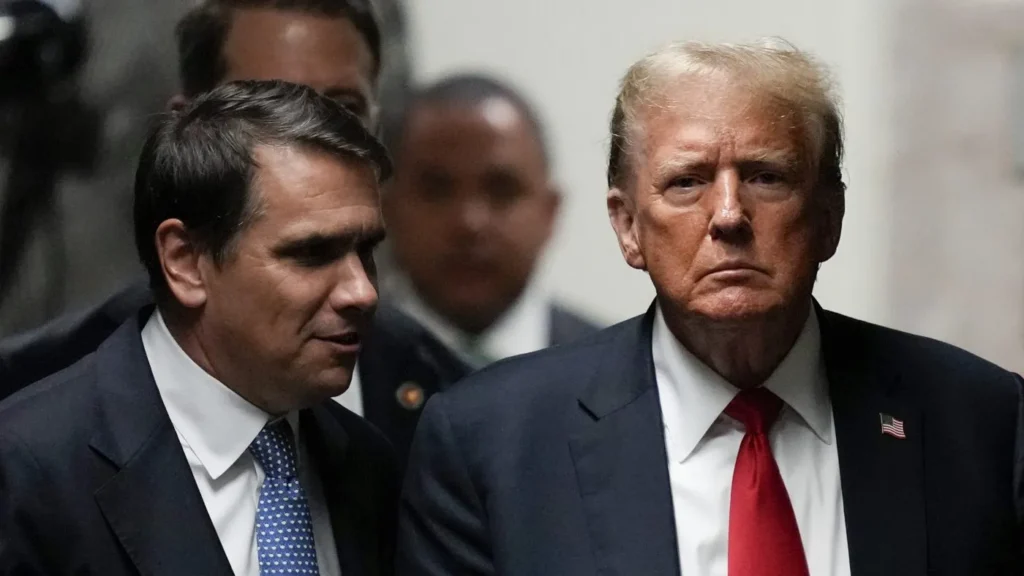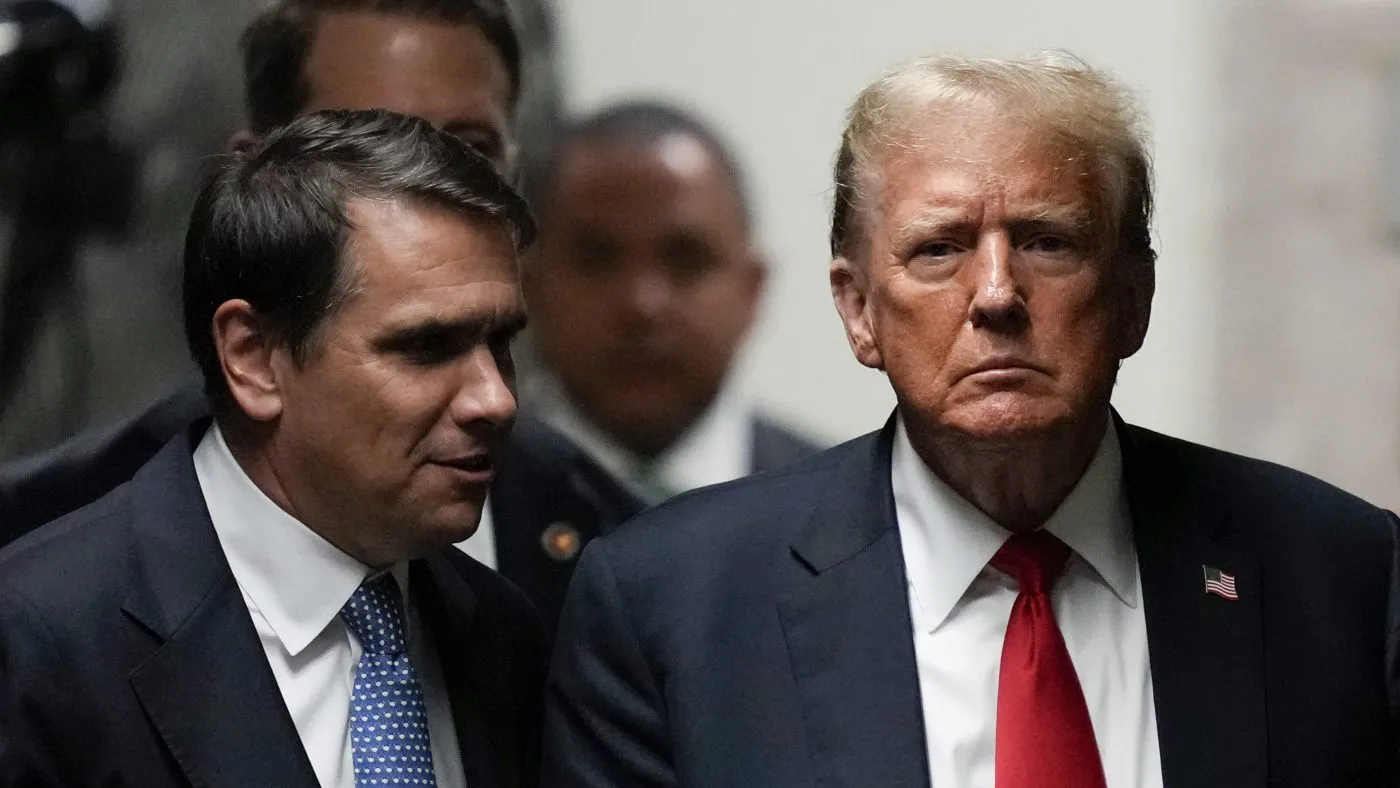Trump guilty verdict, Democrats response, Trump conviction, hush money trial, falsifying business records, political strategy, 2024 elections, Biden response, Pelosi statement, Hakeem Jeffries
Explore why Democrats have adopted a cautious and measured response to Donald Trump’s guilty verdict. Understand the political strategy behind their restraint and the implications for the upcoming 2024 elections.
The conviction of former President Donald Trump on 34 counts of falsifying business records in his hush money coverup trial has sent ripples through the political landscape. However, the responses from the Democratic Party have been markedly muted compared to their Republican counterparts. While Republicans have decried the verdict as a “weaponization of the justice system,” Democrats have approached the situation with caution and restraint.

A Measured Response
One of the most notable aspects of the Democratic response has been the avoidance of any appearance of gloating or triumphalism. White House spokesman Ian Sams encapsulated this approach with a succinct statement: “We respect the rule of law, and have no additional comment.” This sentiment was echoed by President Joe Biden’s reelection campaign, which emphasized that “no one is above the law,” while also noting that the verdict does not alter the fundamental political reality: Trump remains a significant force in the Republican Party. Biden-Harris spokesman Michael Tyler highlighted this by stating, “Convicted felon or not, Trump will be the Republican nominee for president.”
The Political Calculus
The Democrats’ cautious response can be attributed to several factors. Firstly, there is a clear recognition of the political landscape and the potential backlash that overt celebration could provoke. House Speaker Mike Johnson (R-La.) has already framed the verdict as a partisan attack, claiming, “Democrats cheered as they convicted the leader of the opposing party on ridiculous charges.” Such accusations can be damaging, especially in a highly polarized political environment.
Democratic leader Hakeem Jeffries (D-N.Y.) and former House Speaker Nancy Pelosi (D-Calif.) both issued statements that underscored the importance of respecting the judicial process. Jeffries noted that “the jury has spoken,” while Pelosi called the verdict a “somber” moment for America, emphasizing that trial by jury is a cornerstone of democracy.
Pelosi’s reaction is reminiscent of her response to Trump’s first impeachment in 2019, where she took deliberate steps to prevent her colleagues from appearing celebratory. This measured tone aims to convey a respect for the gravity of the situation and the principles of justice, rather than political opportunism.
Strategic Silence
For many Democrats, the strategy appears to be one of strategic silence or minimal commentary. This approach serves several purposes. It avoids giving credence to Republican claims of partisanship, and it also prevents the risk of alienating independent voters who may view excessive partisan rhetoric negatively.
An unnamed Democratic aide encapsulated this strategy, stating, “What is the point of crowing? As an important fact, it makes its own point.” This perspective is rooted in the belief that the conviction itself is sufficiently impactful without the need for additional political commentary. The aide further noted that with the election still months away, there is no immediate need to rush out a message about the verdict.
Vulnerable Seats and Electoral Considerations
The political stakes are particularly high for Democrats facing tough reelection battles. Senators Sherrod Brown of Ohio and John Tester of Montana, both of whom are considered vulnerable, have remained silent on the issue. This silence was quickly seized upon by the National Republican Senatorial Committee (NRSC), which accused them of failing to stand up to their party. NRSC spokesman Philip Letsou suggested that Brown and Tester should rescind their endorsements of Biden, framing the situation as an effort by Democrats to imprison Trump rather than defeat him at the ballot box.
This pressure highlights the delicate balance that Democrats must navigate. On one hand, they must uphold the principles of justice and the rule of law. On the other, they must avoid actions that could be perceived as overly partisan or vindictive, which could jeopardize their electoral prospects.
Progressive Voices and Divergent Reactions
While the majority of Democratic leaders have opted for a cautious approach, some progressive voices have been more vocal in their condemnation of Trump. Representative Pramila Jayapal (D-Wash.) praised the jury’s decision, asserting that “no one is above the law” and labeling Trump as an “existential threat to our democracy.” Similarly, Representative Jamaal Bowman (D-N.Y.) celebrated the verdict with a TikTok video and a fundraising appeal, exclaiming, “BONG! Today, our justice system beat Donald Trump!”
These divergent reactions within the Democratic Party reflect the broader spectrum of views and strategies. Progressives, who are less constrained by the need to appeal to moderate or swing voters, may see more benefit in a forceful denunciation of Trump. However, the party’s overall strategy remains one of cautious pragmatism, aimed at maintaining focus on broader electoral goals rather than getting sidetracked by the legal drama surrounding Trump.
Conclusion
The restrained response from Democrats to Trump’s guilty verdict highlights a calculated political strategy. By avoiding overt celebration or gloating, they aim to respect the judicial process, minimize partisan backlash, and keep the focus on the upcoming elections. This approach underscores the complex interplay between justice and politics in the current American landscape, where every action and reaction is carefully measured against its potential electoral impact. As the election season progresses, this measured approach may prove pivotal in navigating the fraught political waters and maintaining a focus on the broader issues at stake.
Read More-
